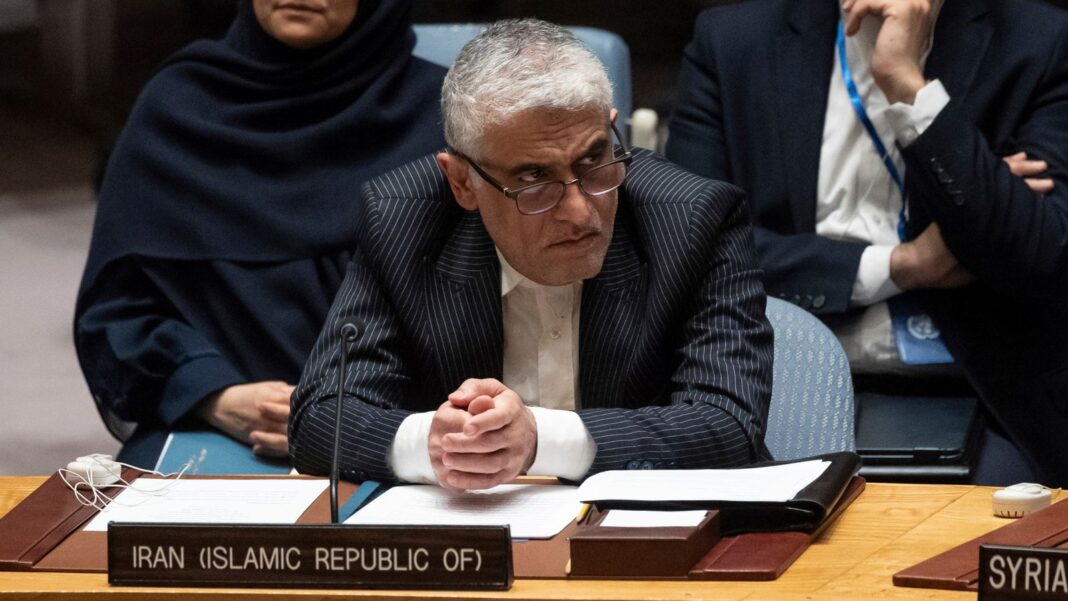Iran’s ambassador to the UN has told Sky News that Israel’s promise of a significant response to Saturday’s attack is “a threat, not an action”.
Amir Saeid Iravani was speaking exclusively to Sky’s James Matthews after an emergency meeting of the UN Security Council in New York on Sunday.
The day before, his country launched more than 300 drones and missiles into Israel in response to a strike on an Iranian consular building in Syria earlier this month which killed two Iranian generals. That strike has been widely blamed on Israel.
Follow live updates after Iran’s attack on Israel
Israel’s war cabinet met on Sunday to discuss possible retaliation against Iran, with the country’s broadcaster Channel 12 quoting an unnamed official as vowing a “significant response”.
Mr Iravani said Israel “would know what our second retaliation would be… they understand the next one will be most decisive”.
But he said he believed a conclusion had been reached, adding: “I think there should be no military response from Israel.”
Iran’s UN ambassador, Amir Saeid Iravani. Pic: AP
The weekend brought long-simmering tensions between the two countries to boiling point, sparking fears that the conflict could spread more widely across the Middle East region.
When asked if his country’s actions had risked escalation towards a wider war, Iranian ambassador Mr Iravani said: “It was our legitimate right to respond because they started aggression against our diplomatic premises.”
Israel managed to repel most of Iran’s weekend attack, with the help of its Iron Dome defence system and forces from the US, UK, Jordan and France.
Analysis:
Will Israel let an attack by Iran go unpunished? Probably not
All-out war, or not, in the Middle East?
Ahead of Israel’s war cabinet meeting, centrist minister and war cabinet member Benny Gantz said: “We will build a regional coalition and exact the price from Iran in the fashion and timing that is right for us.”
Defence Minister Yoav Gallant, who, like Mr Gantz, has decision-making powers in the war cabinet, also spoke of forming an alliance “against this grave threat by Iran, which is threatening to mount nuclear explosives on these missiles, which could be an extremely grave threat”.
Iran denies seeking nuclear weapons.
Read more:
Iran attack was ‘declaration of war’, Israeli president says
How Biden watched the Iranian attack – and what he told Netanyahu
Late on Sunday, United Nations Secretary-General Antonio Guterres joined G7 leaders and Arab nations in calling for calm, telling the UN Security Council: “The Middle East is on the brink.
“The people of the region are confronting a real danger of a devastating full-scale conflict – now is the time to refuse and de-escalate.”
This content is provided by Spreaker, which may be using cookies and other technologies.
To show you this content, we need your permission to use cookies.
You can use the buttons below to amend your preferences to enable Spreaker cookies or to allow those cookies just once.
You can change your settings at any time via the Privacy Options.
Unfortunately we have been unable to verify if you have consented to Spreaker cookies.
To view this content you can use the button below to allow Spreaker cookies for this session only.
Listen above then tap here to follow the Sky News Daily wherever you get your podcasts
Deputy US Ambassador to the UN Robert Wood threatened additional measures at the global body to hold Iran accountable, warning: “If Iran or its proxies take actions against the United States or further action against Israel, Iran will be held responsible.”
The US has already said that, while it does not seek to escalate the conflict, it will continue to defend Israel.







